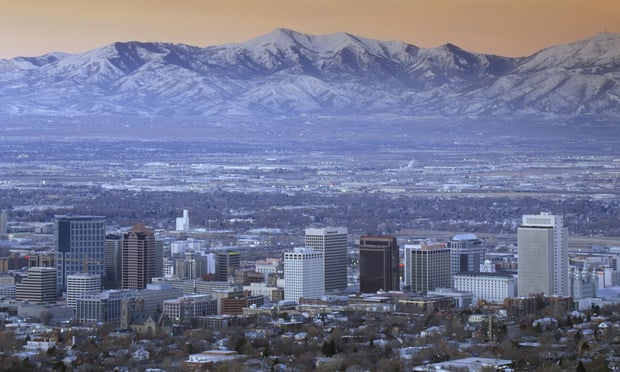Fast-Growing Salt Lake City Feels COVID-19 Fallout
The Salt Lake City legal market stands out from its larger counterparts in several ways. For one, the largest firms by headcount are local ones.
July 31, 2020 at 01:54 PM
6 minute read
 Salt Lake City, with the Wasatch Mountains in the background. – Photo: Joseph Sohm/Shutterstock.com
Salt Lake City, with the Wasatch Mountains in the background. – Photo: Joseph Sohm/Shutterstock.com
Editor's Note: This story is adapted from ALM's Mid-Market Report. For more business of law coverage exclusively geared toward midsize firms, sign up for a free trial subscription to ALM's weekly newsletter, The Mid-Market Report.
Lawyers in Salt Lake City might have their out-of-town counterparts beat when it comes to stunning mountain vistas, but the legal industry in the Crossroads of the West is responding to the COVID-19 pandemic the same way firms in other markets have.
Like other law firms across the U.S., law firms in Salt Lake City have responded to the economic pressures of the pandemic by obtaining federal government assistance, reducing partner draws, cutting salaries, and in some cases, furloughing staffers, according to managing partners and legal consultants there.
"When you're seeing a 10% to 15% contraction in demand, that's going to affect everybody at every level," said Nolan Taylor, the head of Dorsey & Whitney's office in Salt Lake City.
At least 23 law firms based in Salt Lake City borrowed between $26.85 million and $64 million from the federal government in an effort to keep lawyers and staff on the payrolls at the outset of the COVID-19 pandemic, according to data released by the U.S. Small Business Administration. (The data reveals the monetary range in which applicants got loans, though the exact amount obtained by each firm is not revealed).
Despite the loans, a number of firms said they've been forced to make salary cuts in order to keep people on payroll—a trend that's been played out in markets like Chicago and among law firms on the Am Law 200.
"We are prepared to do what we need to do," said N. Todd Leishman, the chairman and president of Durham, Jones & Pinegar, the fourth-largest law firm based in the state of Utah, which received a $2-5 million PPP loan. "The duration of the pandemic and the fact that it hasn't been brought to heel—it's certainly bringing a lot of uncertainty in how we plan our operations."
Parr Brown Gee & Loveless hasn't had to reduce partner draws or cut pay, thanks in part to a busy litigation practice and a $2-5 million PPP loan, but shareholder and past president Jonathan Hafen said those options remain on the table.
"We're continuing to operate profitably and successfully, [but] to the extent that things slow down, we're perfectly willing to look at pay cuts and other measures," Hafen said.
Salt Lake City is the largest city in one of the fastest-growing states in the nation, which Forbes in December 2019 credited with a "strong employment growth, a vibrant tech industry and collaboration between business, labor and government." Several law firm partners and legal consultants took note of this when talking about the legal industry in the Crossroads of the West.
But the pandemic has hit Utah as well. In mid-June, Deseret News reported that Utah's unemployment rate was the second-lowest in the nation, behind Nebraska. JoAnn Seguin, the vice president of human resources, sales and legal recruitment at PrincePerelson, a Salt Lake City-based recruiting firm, said she has gotten a lot of calls from people in sales and human resources fields about layoffs, but not from law firms.
"Many, many high-level executives are saying, 'JoAnn, I have been furloughed or reorganized.' I have a plethora of executives in other professional industries, I have not had that reaction come from the legal community here in Utah," Seguin said.
The furloughs and layoffs have hit regional and national firms that have presences in the Beehive State, including Akerman, Dorsey & Whitney and Snell & Wilmer. The Phoenix-based Snell & Wilmer is in a stronger financial position than it was last year, said Brian Cunningham, a Salt Lake City partner who sits on the firm's executive committee, but the firm was still forced to enact temporary furloughs.
The Salt Lake City legal market stands out from its larger counterparts in several ways. For one, the largest firms by headcount are local ones. There's also not a lot of lateral movement from firm to firm; as Mark Gaylord, the managing partner of Ballard Spahr's outpost here, put it, when partners leave the firm, they're usually going either in-house or to open their own practice.
And that's because the firms in Salt Lake City are not overly aggressive in terms of luring partners away, Leishman said.
"Most of the Salt Lake City firms I'm familiar with try to keep producing attorneys as content and happy as possible," Leishman said. "Salt Lake City firms don't appear to be entering into outsize compensation packages to lure people away. There's not a lot of bidding going on for mobility right now."
Taylor, however, said that statement was a generalization, pointing to his own firm's growth in the Salt Lake City market: According to ALM Legal Intelligence, the firm's office has grown from 34 lawyers to 64 lawyers. Most of that growth was achieved through lateral hiring, Taylor added.
There's also an easier path to becoming partner working at a local firm. Cunningham said an associate who does good work at a local firm will be a partner in three to five years, a track he contrasted to regional and national firms operating in Salt Lake City, where an associate's promotion to partner could easily take eight to 10 years "and the prospects of making partner are much less certain."
Like their counterparts across the country, law firms in Salt Lake City sent the majority of their employees home to work remotely at the start of the pandemic. And like their national counterparts, managing partners in Salt Lake City said there's no rush to get back to the office.
Part of that is due to the fact that the pandemic hasn't ended. There was a hope among people and law firms in Utah that the COVID-19 pandemic would be winding down by summer, which is clearly not the case, Cunningham said. The firms that didn't plan well for the pandemic are going to have tough choices ahead of them, he added.
"Firms who may have been optimistic about revenue projections and demand and other things thought they could simply weather the storm. That's probably unlikely," Cunningham said. "The effects of COVID are going to be here for awhile, and the status quo is going to have to continue."
NOT FOR REPRINT
© 2025 ALM Global, LLC, All Rights Reserved. Request academic re-use from www.copyright.com. All other uses, submit a request to [email protected]. For more information visit Asset & Logo Licensing.
You Might Like
View All
Was It Ever A Profession? A Look at the History of Law Firms as a Business with RJon Robins
1 minute read
Government Attorneys Face Reassignment, Rescinded Job Offers in First Days of Trump Administration
4 minute read
4th Circuit Upholds Virginia Law Restricting Online Court Records Access
3 minute read
Law Firm Sued for Telemarketing Calls to Customers on Do Not Call Registry
Law Firms Mentioned
Trending Stories
- 1Treasury GC Returns to Davis Polk to Co-Chair White-Collar Defense and Investigations Practice
- 2Decision of the Day: JFK to Paris Stowaway's Bail Revocation Explained
- 3Doug Emhoff, Husband of Former VP Harris, Lands at Willkie
- 4LexisNexis Announces Public Availability of Personalized AI Assistant Protégé
- 5Some Thoughts on What It Takes to Connect With Millennial Jurors
Who Got The Work
J. Brugh Lower of Gibbons has entered an appearance for industrial equipment supplier Devco Corporation in a pending trademark infringement lawsuit. The suit, accusing the defendant of selling knock-off Graco products, was filed Dec. 18 in New Jersey District Court by Rivkin Radler on behalf of Graco Inc. and Graco Minnesota. The case, assigned to U.S. District Judge Zahid N. Quraishi, is 3:24-cv-11294, Graco Inc. et al v. Devco Corporation.
Who Got The Work
Rebecca Maller-Stein and Kent A. Yalowitz of Arnold & Porter Kaye Scholer have entered their appearances for Hanaco Venture Capital and its executives, Lior Prosor and David Frankel, in a pending securities lawsuit. The action, filed on Dec. 24 in New York Southern District Court by Zell, Aron & Co. on behalf of Goldeneye Advisors, accuses the defendants of negligently and fraudulently managing the plaintiff's $1 million investment. The case, assigned to U.S. District Judge Vernon S. Broderick, is 1:24-cv-09918, Goldeneye Advisors, LLC v. Hanaco Venture Capital, Ltd. et al.
Who Got The Work
Attorneys from A&O Shearman has stepped in as defense counsel for Toronto-Dominion Bank and other defendants in a pending securities class action. The suit, filed Dec. 11 in New York Southern District Court by Bleichmar Fonti & Auld, accuses the defendants of concealing the bank's 'pervasive' deficiencies in regards to its compliance with the Bank Secrecy Act and the quality of its anti-money laundering controls. The case, assigned to U.S. District Judge Arun Subramanian, is 1:24-cv-09445, Gonzalez v. The Toronto-Dominion Bank et al.
Who Got The Work
Crown Castle International, a Pennsylvania company providing shared communications infrastructure, has turned to Luke D. Wolf of Gordon Rees Scully Mansukhani to fend off a pending breach-of-contract lawsuit. The court action, filed Nov. 25 in Michigan Eastern District Court by Hooper Hathaway PC on behalf of The Town Residences LLC, accuses Crown Castle of failing to transfer approximately $30,000 in utility payments from T-Mobile in breach of a roof-top lease and assignment agreement. The case, assigned to U.S. District Judge Susan K. Declercq, is 2:24-cv-13131, The Town Residences LLC v. T-Mobile US, Inc. et al.
Who Got The Work
Wilfred P. Coronato and Daniel M. Schwartz of McCarter & English have stepped in as defense counsel to Electrolux Home Products Inc. in a pending product liability lawsuit. The court action, filed Nov. 26 in New York Eastern District Court by Poulos Lopiccolo PC and Nagel Rice LLP on behalf of David Stern, alleges that the defendant's refrigerators’ drawers and shelving repeatedly break and fall apart within months after purchase. The case, assigned to U.S. District Judge Joan M. Azrack, is 2:24-cv-08204, Stern v. Electrolux Home Products, Inc.
Featured Firms
Law Offices of Gary Martin Hays & Associates, P.C.
(470) 294-1674
Law Offices of Mark E. Salomone
(857) 444-6468
Smith & Hassler
(713) 739-1250








